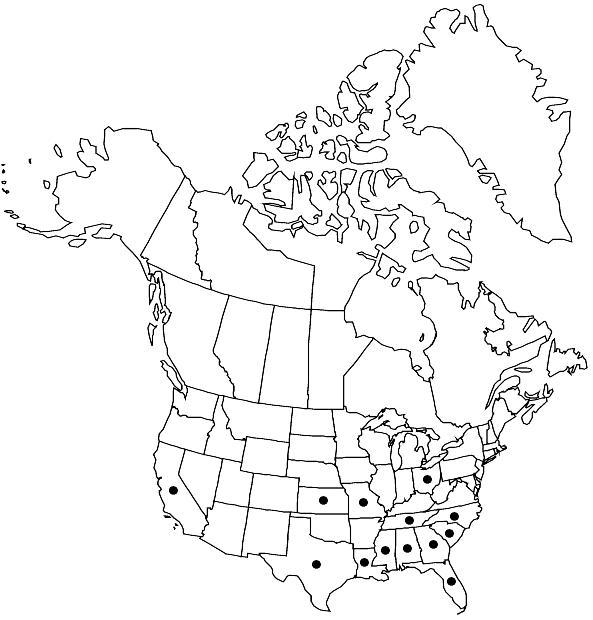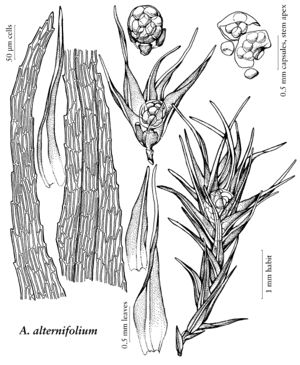Archidium alternifolium
Ann. Mag. Nat. Hist., ser. 2, 8: 306. 1851,.
Plants 2–20 mm, perennial, gregarious or in dense short turfs, green or yellow-green. Stems simple to branched by several sterile innovations to 15 mm, becoming prostrate with age. Stem-leaves erect to erect-spreading, ovatelanceolate to lanceolate or triangular, acuminate to subulate, 0.5–2.5 mm; costa strong, percurrent to short-excurrent, sometimes long-excurrent in long subulate tip; laminal margins plane, smooth or finely serrulate distally; median laminal cells rhomboidal to linear-rhomboidal, 5–15: 1, 45–160 × 8–14 µm, becoming somewhat shorter distally, proximal cells rectangular, 3–8: 1, 45–90 × 9–18 µm, cells in alar region short-rectangular to quadrate, 1–2: 1, in 2–3 rows extending from 3–10 cells distally from base along margin; leaves of innovations similar to stem-leaves but smaller, gradually reduced proximally. Perichaetial leaves erect, concave, sometimes flexuose, ovatelanceolate, acuminate to strongly subulate, laminal cells similar to stem-leaves except proximal and alar cells long-rectangular, 6–10: 1, 90–140 × 14–20 µm, distinctly hyaline, at least in alar region. Specialized asexual reproduction occasional, of filiform uniseriate rhizoidal tubers. Sexual condition paroicous; antheridia typically naked or occasionally 1–2 small bracts present. Capsule terminal, sometimes appearing lateral due to rapid innovation growth, 300–800 µm. Spores typically 16 (8–36) per capsule, rounded to polyhedral, 120–260 µm, smooth or finely papillose, pale-yellow to golden.
Phenology: Capsules mature late fall to early spring (Nov–Mar).
Habitat: Common on moist to wet soil, mud and sand around temporary pools, along ditches and roadsides, and in fields, occasional on sandstone and limestone outcrops
Elevation: 0-700 m
Distribution

Ala., Calif., Fla., Ga., Kans., La., Miss., Mo., N.C., Ohio, S.C., Tenn., Tex., Mexico, Europe, n Africa, Atlantic Islands
Discussion
Archidium alternifolium is widely distributed in the southeastern region of the United States. It is closely related to A. tenerrimum, which differs by much shorter and wider lamina cells and smooth margins of perichaetial leaves. The filiform rhizoidal gemmae are difficult to find, as most collections of the species have abundant uniseriate algae growing among the rhizoids. Recently, material referred to A. alternifolium was collected in Santa Cruz County, California. The collection is somewhat different than typical material, however, as it has strongly subulate perichaetial leaves and much shorter lamina cells, with those in mid-leaf being somewhat irregular in shape and size. Only a few plants were found, and more material is needed to determine their status. However, collections identified as A. donnellii and A. hallii have recently been reported from the Pacific coast of Baja California, so the presence of A. alternifolium is not completely unexpected.
Selected References
None.
Lower Taxa
"um" is not declared as a valid unit of measurement for this property.
